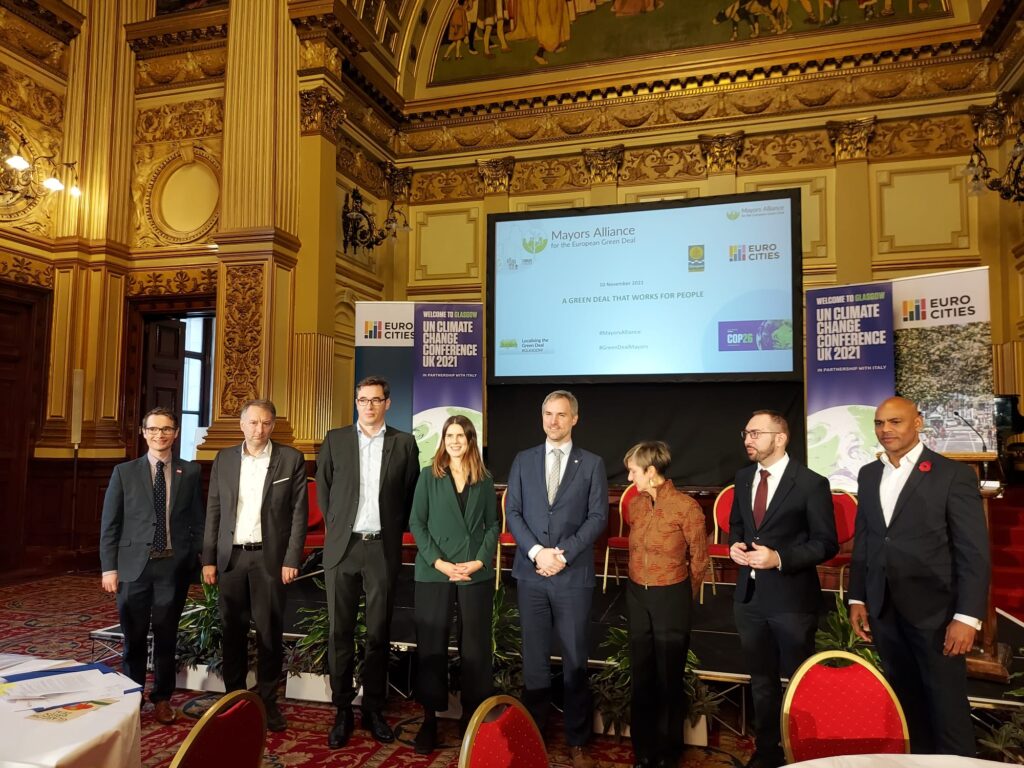The ‘COP26 Insights series’ draws on thought leadership, key debates and lessons learned directly from COP26 in Glasgow where global experts gathered recently to discuss and agree on ambitious net zero climate targets to limit global warming to 1.5 degrees. This series written by Visiting Fellow Dr Katherine Maxwell explores discussions that centre on the nexus between urbanisation and health and well-being; two key issues as the world grapples with rapid urban growth, rising temperatures whilst simultaneously comes to terms with recovering from the COVID-19 pandemic.
Read the first article in the series “Addressing the climate crisis requires both anger and optimism” on the Kellogg College website.
Cities are leading the way in
This article draws on the Green New Deal Mayors panel session run by Euro Cities and the Mayors’ Alliance for the European Green New Deal at Glasgow City Chambers. The Green New Deal promises to create millions of jobs by tackling economic inequality. The event brought together ten European mayors to discuss the key actions they were taking against climate change and outline their wider priorities to accelerate the transition to net zero. Here we explore some key themes around the environmental benefits of climate actions and the challenges they bring.
Climate actions – what key actions are being implemented within European cities?
Mobility
There was a sharp focus on the need to enhance the public transport system within cities by, firstly, prioritising active travel infrastructure and uptake and, secondly, by subsidising public transport as part of wider discussions on improving accessibility within urban areas (e.g., ensuring everyone can access opportunities such as jobs) as well as using lower carbon fuel alternatives for buses (e.g., zero emissions buses). Thirdly, cities were introducing measures that would disincentivise private vehicle use by creating Low Emission Zones in the city centre and reducing speed limits through the city. Shifting to active travel was seen by mayors as a way to also improve public health which is also a central as part of the COIVD-19 recovery and would have additional health benefits by improved air quality as well.
Built environment – Housing
With buildings responsible for a significant proportion of a city’s carbon emissions, many mayors are retro-fitting existing homes by introducing insulation and other energy efficiency measures on domestic properties as well as initiating energy power packages to further reduce costs (in particular for the most vulnerable in society). In European cities, tackling the housing crisis was deemed a priority, with new builds required to meet stricter energy standards and existing buildings to be retro-fitted.
Food systems
The need to shift the food system towards producing more locally grown food for urban residents was central to the priorities of many mayors’ priorities. Reducing reliance on the number of food imports was regarded as necessary to protect local agriculture, create or sustain jobs and strengthen resilience of the urban environment through improved local biodiversity (e.g., the creation of green space within a city brings many health benefits such as improved air quality). This would negate the need for transporting fresh produce from around the world. Issues such as child hunger, evident in many cities around the globe, can be addressed through local food production, creating affordable, accessible, and nutritious food for young people.

Priorities – what do cities need to address?
Funding the transition
Climate finance is a significant challenge for any mayor and was mentioned numerous times in the discussions. Funding is not always available from national governments, so cities are exploring alternatives such as collaboration public private partnerships and other innovative financing models in order to deliver on their climate commitments. Cities need long-term and predictable investment to support them in the transition to net zero.
Multi-level governance and support
In some cases, local and national governments don’t always see eye to eye when it comes to the climate crisis. In some cities, such as Budapest, the national government doesn’t quite align with the city’s urban climate action. This can be a significant barrier to climate action as cities do not have the support from their national government through backing regulatory reform and funding. As such, many cities argue for closer ties between European cities.
Inclusivity in the decision-making process
The net zero transition will require urban residents to buy-in to new technologies, consumption patterns and systems as well as develop new behaviours (e.g., reducing meat consumption, driving less, etc.). One way this can be achieved is by ensuring that all residents (e.g., including under-represented groups) have a say in the types of climate actions being implemented at local level. Inclusion within the decision-making process is crucial and is not a side project and Mayors are in a key position to ensure that everyone’s voice is reflected to ensure a more just transition that works for everyone.
Summary
The climate actions demonstrate how the climate conversation has shifted away from small scale actions to large, city- and systems- wide actions. As social and economic centres, cities have a significant role to play in addressing climate change and demonstrates that they are aware of the challenges that they will face in reaching net zero. It’s essential that mayors create a clear ‘mission’ that clarifies how they will address the climate crisis and that this is fully backed by scientific evidence. The journey will require new innovative ideas to achieve the climate goals and, given the complexity of the challenge, it will require action by all actors in society. Mayors play a pivotal role in setting the scale of ambition and drawing on international best practice to deliver real change on the ground in their own cities.
Dr Katherine Maxwell, Visiting Fellow, Kellogg College
